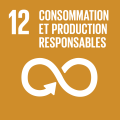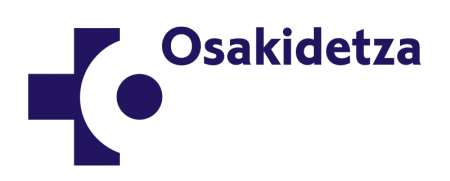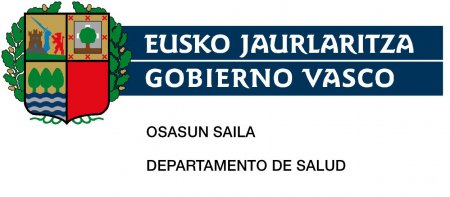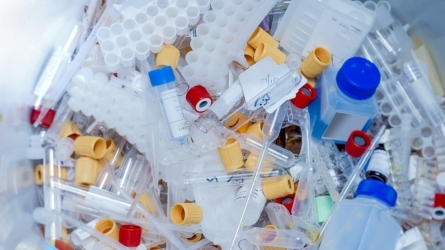
Environmental impact of pharmaceuticals
Description
We live in an increasingly polluted world. In addition to the well known "legacy" environmental pollutants, the so-called pollutants of emerging interest are increasingly worrying scientists. Of all of them, those that give rise to the greatest concern are drugs, which is why their study is among the priority lines of research of the main organizations dedicated to the protection of public and environmental health, such as the World Health Organization ( WHO) or the European Commission. One of the fundamental sections of this strategy is the awareness / education of health professionals. For a comprehensive approach to the problem, it is essential to train future generations of health professionals in the field. It is essential to publicize and address this problem linked to contamination by drugs and medicines to society in general and to professionals in the sector in particular. All those agents involved in the complex drug cycle must know basic aspects about their impact on the environment and human health and, more importantly, possible solutions to the problem. The Summer Course on Drug Pollution aims to expand knowledge about the problem of contamination by drugs, its consequences and environmental impact as well as describe and reflect on possible solutions in the short and medium term. This summer course will be of special interest to all students and professionals of the degrees of the bio-health branch, as well as students, scientists and professionals from other fields (biology, veterinary medicine, environment, toxicology, study of wastewater, regulators, etc.), and will have an international focus.
Objectives
Understand the problem of environmental contamination by medicines.
Learn potential solutions to the problem of environmental contamination by drugs.
Activity directed to
- University student
- Students not from university
- Teachers
- Professionals
- All public
Program
30-06-2022
Registro y entrega de documentación
“ Inauguración oficial del curso de verano“Presentation by the Director of the activity
- Gorka Orive Arroyo | UPV/EHU - Profesor de Farmacia
- Unax Lertxundi Etxebarria | Osakidetza
PARTE I: EL PROBLEMA DE LA FARMACONTAMINACIÓN
“Introducción a la farmacontaminación.“
- Gorka Orive Arroyo | UPV/EHU - Profesor de Farmacia
“ Presencia de fármacos en el medio ambiente“
- Tomas Brodin | Professor Swedish University of Agricultural Sciences SLU · Wildlife, Fish and Environmental Studies
“Consecuencias de los fármacos en el medioambiente. Problemas ecotoxicológicos“
- Miren Cajaraville Bereciartua | UPV/EHU - Facultad de Ciencia y Tecnología, Zoologia y Biologia Celular Animal
“Legislación y farmacontaminación“
- Ricardo Carapeto García
Round table: “Mesa redonda “
- Ricardo Carapeto García (Moderator)
- Iker Armentia Ortiz de Zarate
- Miren Cajaraville Bereciartua | UPV/EHU - Facultad de Ciencia y Tecnología, Zoologia y Biologia Celular Animal
- Tomas Brodin | Professor Swedish University of Agricultural Sciences | SLU · Wildlife, Fish and Environmental Studies
- Gorka Orive Arroyo | UPV/EHU - Profesor de Farmacia
01-07-2022
“Visión global del abordaje del problema. Soluciones“
- Unax Lertxundi Etxebarria | Osakidetza
PARTE II: POSIBLES SOLUCIONES
“ Nuevas tecnologías para eliminar fármacos de las aguas residuales“
- José Benito Quintana ÁLvarez | Universidad Santiago Compostela
“Ecofarmacovigilancia“
- Carmelo Aguirre | UPV/EHU - Facultad de Medicina y Enfermería
“ Esquemas take-back“
- Mario Zarzuela | SIGRE
Round table: “Mesa redonda “
- Iker Armentia Ortiz de Zarate (Moderator)
- Unax Lertxundi Etxebarria | Osakidetza
- José Benito Quintana ÁLvarez | Universidad Santiago Compostela
- Carmelo Aguirre | UPV/EHU - Facultad de Medicina y Enfermería
- Mario Zarzuela | SIGRE
Directors

Gorka Orive Arroyo
UPV/EHU, Doctor en Farmacia
Doctor Gorka Oriva, aged 44, is a prolific, multi-faceted pharmacy lecturer, researcher, teacher, educator and entrepreneur. He takes part in a range of research projects. His academic output is outstanding, including a total of 318 international publications, 45 in Spain, 25 book chapters and 3 books as principal editor. He has an h-index of 70 and over 18,400 citations. His academic output is over 20 international articles a year over the last 10 years. He is in the top 1% of scientists by h-index in a sample of 55,000 in Spain. Moreover, in the recent “Top Scientific Rankings” drawn up by Stanford University, he heads the list of the most influential pharmaceutical researchers in Spain, and is one of the top 30 scientists in the world in this category, counting those still working who published their first article in the 21st century. He is founder and CSO of the firm Geroa Diagnostics.
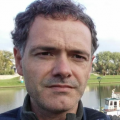
Unax Lertxundi Etxebarria
Osakidetza, Doctor en Farmacia
Unax Lertxundi works as Head of the Pharmacy Section in the Araba Mental Health Network, part of Osakidetza, the Basque Health Service. In 2002 he came first in the national entrance examination for FIR, or Resident In-House Pharmacists. Holder of a doctorate in Pharmacy from the University of the Basque Country (special prize-winner), he has led and taken part in numerous research projects, and is the author of more than 60 articles in international academic journals and 60 conference papers, having won numerous awards. He is also one of 16 European professionals to be a Board Certified Psychiatric Pharmacy (BCPP) specialist, awarded by the prestigious American Pharmacists Association.
Speakers

Carmelo Aguirre

Iker Armentia Ortiz de Zarate

Tomas Brodin
Tomas Brodin is an aquatic ecologist, studying ecological effects of pharmaceuticals in aquatic systems. Tomas has a background in evolutionary- and behavioral ecology, and is now using this knowledge to increase the ecological relevance of chemical risk-assessment in general, and pharmaceutical risk-assessment in particular. His research bridges the gap between the lab and the real world by combining lab-experiments, for mechanistic understanding, with large-scale field studies that answers the million dollar question “What happens in the lake or stream?”

Miren Cajaraville Bereciartua
Biologia Molekularreko katedraduna, irakasle eta ikerlari lanetan aritu da EHUko Medikuntza Fakultatean eta Zientzia eta Teknologia Fakultatean. Ikerkuntza-egonaldiak egin ditu hainbat unibertsitatetan: University of Wales, Universität Heidelberg, King´s College School of Medicine and Dentistry, San Diegoko University of California eta University of Hong Kong. Haren ikerketa-jarduera honako eremu hauetan zentratzen da: kutsaduraren biomarkagailu molekular eta zelurarrak garatu eta aplikatzea, zelula-kultiboak eta in vitro toxikotasun mekanismoak, transkriptomika eta proteomika, zelulen patologia eta histopatologia, honako elementu hauek eragindako kutsadura kimikoari lotuta: hidrokarburo aromatikoak eta petrolioa, disruptore endokrinoak, nanomaterialak eta mikroplastikoak. EHUko Zoologia eta Animalia Zelulen Biologia Saileko idazkari akademikoa izan da (2009-2010), eta Graduondoko Ikasketen eta Etengabeko Prestakuntzaren Unitateko zuzendari-kargua izan du (2010-2011), baita Master eta Doktorego Eskolako zuzendari-postua ere (2012). 2013az geroztik, Zoologia eta Animalia Zelulen Biologia Saileko zuzendaria da.

Ricardo Carapeto García

Unax Lertxundi Etxebarria
Osakidetza, Doctor en Farmacia
Unax Lertxundi works as Head of the Pharmacy Section in the Araba Mental Health Network, part of Osakidetza, the Basque Health Service. In 2002 he came first in the national entrance examination for FIR, or Resident In-House Pharmacists. Holder of a doctorate in Pharmacy from the University of the Basque Country (special prize-winner), he has led and taken part in numerous research projects, and is the author of more than 60 articles in international academic journals and 60 conference papers, having won numerous awards. He is also one of 16 European professionals to be a Board Certified Psychiatric Pharmacy (BCPP) specialist, awarded by the prestigious American Pharmacists Association.

Gorka Orive Arroyo
UPV/EHU, Doctor en Farmacia
Doctor Gorka Oriva, aged 44, is a prolific, multi-faceted pharmacy lecturer, researcher, teacher, educator and entrepreneur. He takes part in a range of research projects. His academic output is outstanding, including a total of 318 international publications, 45 in Spain, 25 book chapters and 3 books as principal editor. He has an h-index of 70 and over 18,400 citations. His academic output is over 20 international articles a year over the last 10 years. He is in the top 1% of scientists by h-index in a sample of 55,000 in Spain. Moreover, in the recent “Top Scientific Rankings” drawn up by Stanford University, he heads the list of the most influential pharmaceutical researchers in Spain, and is one of the top 30 scientists in the world in this category, counting those still working who published their first article in the 21st century. He is founder and CSO of the firm Geroa Diagnostics.

José Benito Quintana ÁLvarez

Mario Zarzuela
Registration fees
| Face-to-face | Until 30-06-2022 |
|---|---|
| 80,00 EUR | |
| 68,00 EUR | |
| 56,00 EUR | |
| 20,00 EUR | |
| 0 EUR |
| Live online | Until 30-06-2022 |
|---|---|
| 80,00 EUR | |
| 68,00 EUR | |
| 56,00 EUR | |
| 20,00 EUR | |
| 0 EUR |
Venue
Villa Suso Palace
Plaza del Machete. 01001 Vitoria-Gasteiz
Araba
Sustainable development goals
Agenda 2030 is the new international development agenda approved in September 2015 by the United Nations. This agenda aims to be an instrument to favour sustainable human development all over the planet, and its main pillars are the eradication of poverty, a reduction in equality and vulnerability and fostering sustainability. It is a unique opportunity to transform the world up to 2030 and guarantee human rights for all.

3 - Good health and well-being
Guarantee a healthy life and foster the well-being of all people of all ages. Key issues: universal healthcare coverage, sexual and reproductive health, reduction in the number of road accident casualties, pollution and chemical products, reduction in maternal and neonatal mortality, the end of epidemics such as AIDS, combating hepatitis and other water-borne diseases, drug and alcohol prevention, control of tobacco.
More information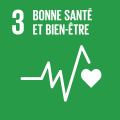
4 - Quality education
Guarantee quality education that is inclusive and equitable and foster opportunities for lifelong learning for everyone. Key issues: free-of-charge, equitable and quality education, access to higher education and training on an equal basis, education for sustainable development, suitable education centres for persons with disabilities, and safe, non-violent and efficient learning environments.
More information
6 - Clean water and sanitation
Guaranteeing the availability and sustainable management of water and sanitation for everyone. Key issues: universal and fair access at an affordable price, access to sanitation and hygiene services, water quality, efficient use of water resources, end-to-end management, protection of water ecosystems, reduction of pollution, elimination of waste discharges, wastewater treatment.
More information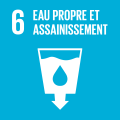
9 - Industry, innovation and infrastructure
Build resilient infrastructures, promote inclusive and sustainable industrialisation and foster innovation. Key issues: reliable, sustainable, resilient and quality infrastructures, inclusive and sustainable industrialisation, modernisation, clean and environmentally rational industrial technologies and processes, scientific research and improvement of technological capabilities, universal access to ICTs.
More information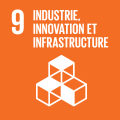
12 - Responsible consumption and production
Guarantee sustainable modalities of consumption and production. Key issues: sustainable management and efficient use of natural resources, reduction of chemical particles released to the atmosphere, water and soils, reduction of waste products, recycling, reuse and reduction, sustainable practices, sustainable public procurement, sustainable lifestyles, rationalisation of inefficient subsidies for fossil fuels.
More information